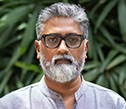Vikas John’s primary area of work is higher education administration. He is involved with the day-to-day processes of the IIHS Research Programme as well as contributing to designing and achieving the strategic goals of the programme. His background is in communication studies, both in terms of educational credentials and work experience in the field. His interests lie in the areas of educational studies, particularly the experiences of techno-scientific knowledge systems as it intersects with the socio-cultural construction of identity. He is interested in research management, research communication, and the social and philosophical foundations of education.
Vikas has assisted in several small and large-scale research projects. He was involved with the Ford Foundation-funded International Comparative Higher Educational Finance and Accessibility Project, and the Women and Higher Education in Asia project, both housed at the University at Buffalo. More recently, Vikas has worked on the Knowledge in Action for Urban Equality (KNOW) project, looking at the student and alumni trajectories in planning education across multiple sites. He is also part of the Spencer Foundation-funded project on bridging access to higher education and the role of community based preparatory sites.
Prior to this, he has worked in the field of communication in various capacities. He gained substantial experience in designing and executing effective messaging across different channels. In addition, his master’s thesis at the Rochester Institute of Technology examined the effectiveness of websites in health communication. Vikas also has a knowledge base in development communication, which he specialised in at the University of Hyderabad. His final project was a documentary film on housing and land tenure rights among the urban poor called ‘Kya aap ghar todne aayen hain?’ (Have you come to break our homes?) (2001).
Vikas has given presentations around educational mobility and the construction of identity at the postgraduate level in engineering education at the annual and regional conferences of the Comparative and International Educational Society (CIES); and the annual conference of the American Educational Research Association. He has also presented his work on the KNOW project at international conferences and national conferences, including RC21, CIES, and the Development Studies Association (DSA) conference. Vikas also works in the areas of critical infrastructure studies, more specifically looking at the evolution of single screen theatres in Bengaluru. Work from this has been presented at RC21 and the DSA conference. He has also been a member of the American Educational Research Association and was on the student editorial committee for the section on Social and Institutional Analysis of the American Educational Research Journal.







